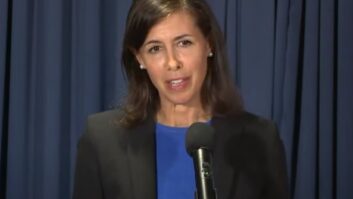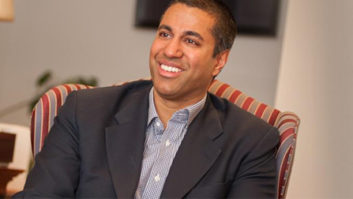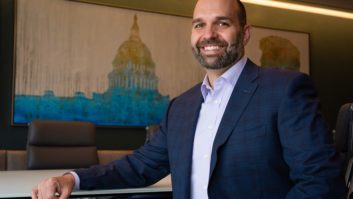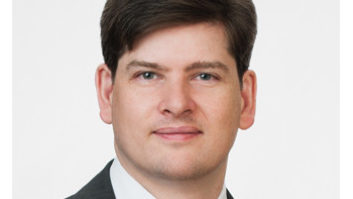Radio broadcasters might not have known much about new FCC Commissioner Ajit Pai prior to last month’s Radio Show in Dallas, but he got the attention of attendees. Pai said he wants the commission to help revitalize AM radio and to eliminate the newspaper/radio cross-ownership ban in all markets. He also expressed optimism that the agency can agree to eliminate restrictions on radio/TV cross-ownership.
Here are excerpts from his address.

FCC Commissioner Ajit Pai called in September for the launch of an AM Radio Revitalization Initiative.
Credit: © NAB
As we head into the future, I believe that broadcasting should and will continue to play an important role in America’s media landscape. … I don’t view broadband as a substitute for broadcast. Instead, I see broadcast and broadband as complements.
Unfortunately, it seems there’s a widespread perception that today’s FCC is largely indifferent to the fate of your business.
Just to be clear, I don’t believe that this impression is accurate. I care about broadcasting. And I can tell you that the staff members of the Media Bureau’s Audio Division work hard every day on issues of concern to radio broadcasters. … But I do understand where broadcasters are coming from. I agree that the commission can do a better job of focusing on what’s important to broadcasters. We also need to make a greater effort to keep the lines of communication open between us.
AM revitalization
[I]t’s time to take another look at our AM radio regulations. The FCC last conducted a thorough review of those rules 21 years ago. Since that time, AM radio has continued its relative decline. There are 20 percent more FM stations today than there were in 2002. Just another piece of evidence that broadcast radio is still strong. But unfortunately, the number of AM stations has actually fallen during that same period.
Within the 12–34 age range, AM stations currently account for less than 10 percent of radio listening. These younger listeners should represent the future of AM radio, but many of them never tune in.
In order to reverse these trends, I propose that the commission launch an AM Radio Revitalization Initiative in early 2013. Specifically, we should conduct a comprehensive review of all our AM radio rules. We should focus on one basic question: Are there regulatory barriers we can remove to help this sector rebound?
There have been many changes in technology since we last reviewed these rules back in 1991. One notable change is that AM reception has gotten worse. The causes of interference to AM signals have only expanded in the last two decades. If you’ve tried flipping through the AM dial recently, you know what I’m talking about. But I’m hopeful that we can identify and implement reforms that will improve AM radio service.
In fact, a variety of ideas already have been put on the table for liberalizing the commission’s technical rules to allow for broader and better reception of AM signals. Some have advocated for an across-the-board power increase for AM stations. Some have called for the use of synchronous AM transmission systems. And some have encouraged the development of so-called “anti-skywave antennas” so that some AM stations won’t have to go dark at night. The AM Radio Revitalization Initiative should explore each of these suggestions and many others. … We should aim to complete this initiative one year later, in early 2014.
Media ownership
We should finish reviewing our ownership regulations by the end of this year. Congress instructed the commission to review our media ownership rules every four years. That’s why it’s called a quadrennial review. But it has been almost five years since we completed our last media ownership proceeding.
I realize that there will be plenty of disagreement on how we should reform our ownership regulations. But I hope that there are at least a couple of areas where we can reach a broad consensus. Most obviously, I believe that the time has come to make substantial changes to the newspaper/broadcast cross-ownership rule (or NBCO for short). Our current NBCO prohibition has been in place since 1975.
Likewise, newspapers and broadcasting were pretty much the only game in town in 1975. But there have been revolutionary changes in our media landscape over the last 37 years. Satellite radio competes with terrestrial; cable and satellite television compete with broadcast. The rise of the Internet has given broadcasters new opportunities but created substantial new competition. And the decline of traditional advertising revenues has impacted broadcasters and newspapers alike. The commission’s media ownership rules cannot ignore these unmistakable marketplace realities.
The commission issued a proposal for reforming the NBCO rule in 2011. That was a step in the right direction. But it doesn’t go far enough. For example, I believe we should eliminate restrictions on newspaper/radio cross-ownership. Not just in the top 20 markets, but in all markets.
I have looked through the record compiled by the commission on this issue, and the simple fact is this: No one has presented significant evidence to justify the continued prohibition of newspaper/radio cross-ownership.
For if you believe in localism, then you should know that cross-owned radio stations are four to five times more likely to have a news format, according to an FCC-commissioned study. If you believe in competition, then you should know that cross-ownership is good for business; it allows for local news to be gathered in an economically efficient manner and then distributed across multiple platforms.
Aside from repealing the newspaper-radio cross-ownership rule, I am also optimistic that we can reach a consensus on eliminating the radio-television cross-ownership rule. I agree with the commission’s 2011 conclusion that the rule is no longer necessary to protect competition, localism, or diversity.
License renewals
[T]he commission must rededicate itself to processing broadcast license renewals in a timely fashion. Renewal applications shouldn’t languish at the commission for years. With the U.S. Supreme Court issuing its indecency decision earlier this year, now is the time for the commission to act. We should both clear the backlog of complaints that have piled up over the last several years and address the hundreds of license renewal applications that remain pending.












